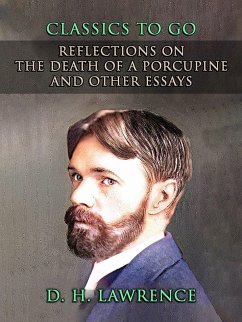Reflections On The Death of a Porcupine and Other Essays by D. H. Lawrence is a profound exploration of the human condition, touching on themes that continue to resonate deeply in today's society. The book is a collection of essays that delve into the complexities of human nature, society, and the individual's place within it. Lawrence's essays are rich with introspection and critique, offering a lens through which modern readers can examine contemporary issues such as identity, freedom, and the clash between nature and industrialization. One of the central themes in the collection is the tension between individualism and societal expectations. Lawrence often critiques the constraints that society places on the individual, urging for a more authentic existence that is true to one's inner self. This theme is particularly relevant today as people grapple with the pressures of social media, societal norms, and the quest for personal authenticity in a digital age. Another significant theme is the relationship between humans and nature. In the titular essay, Reflections On The Death of a Porcupine, Lawrence uses the death of an animal as a metaphor to explore the interconnectedness of life and the often destructive impact of human activity on the natural world. This theme echoes current environmental concerns and the urgent need for sustainable living practices. Lawrence's reflections encourage readers to reconsider their relationship with nature and the environment, making the book incredibly pertinent in the context of climate change and environmental degradation. The essays also tackle the notion of freedom versus control, both in personal relationships and broader societal structures. Lawrence's insights into the dynamics of power and control are particularly insightful, shedding light on the struggles for autonomy and self-determination that continue to define many social movements today. The essays resonate with contemporary discussions on gender equality, racial justice, and the fight against oppressive systems. Lawrence's writing is not only thought-provoking but also stylistically unique. His prose is imbued with a poetic quality that enhances the depth of his reflections. This stylistic choice makes the essays engaging and accessible, drawing readers into his contemplative world. The blend of lyrical language and philosophical inquiry ensures that the book remains a captivating read for modern audiences. Furthermore, Lawrence's examination of love and human relationships offers timeless insights into the complexities of human connections. His essays explore the profound and sometimes turbulent emotions that define relationships, making them relatable to anyone who has navigated the intricacies of love and intimacy. In summary, Reflections On The Death of a Porcupine and Other Essays by D. H. Lawrence is a compelling collection that addresses themes of individualism, nature, freedom, and human relationships. Its relevance to contemporary society cannot be overstated, as it provides valuable perspectives on issues that continue to shape our world. Lawrence's eloquent prose and deep philosophical insights make this book a must-read for anyone seeking to understand the human condition and the societal challenges we face today. By engaging with these essays, modern readers can gain a greater appreciation for the enduring questions of existence and the ongoing quest for a more authentic and harmonious life.
Dieser Download kann aus rechtlichen Gründen nur mit Rechnungsadresse in A, B, BG, CY, CZ, D, DK, EW, E, FIN, F, GR, HR, H, IRL, I, LT, L, LR, M, NL, PL, P, R, S, SLO, SK ausgeliefert werden.









